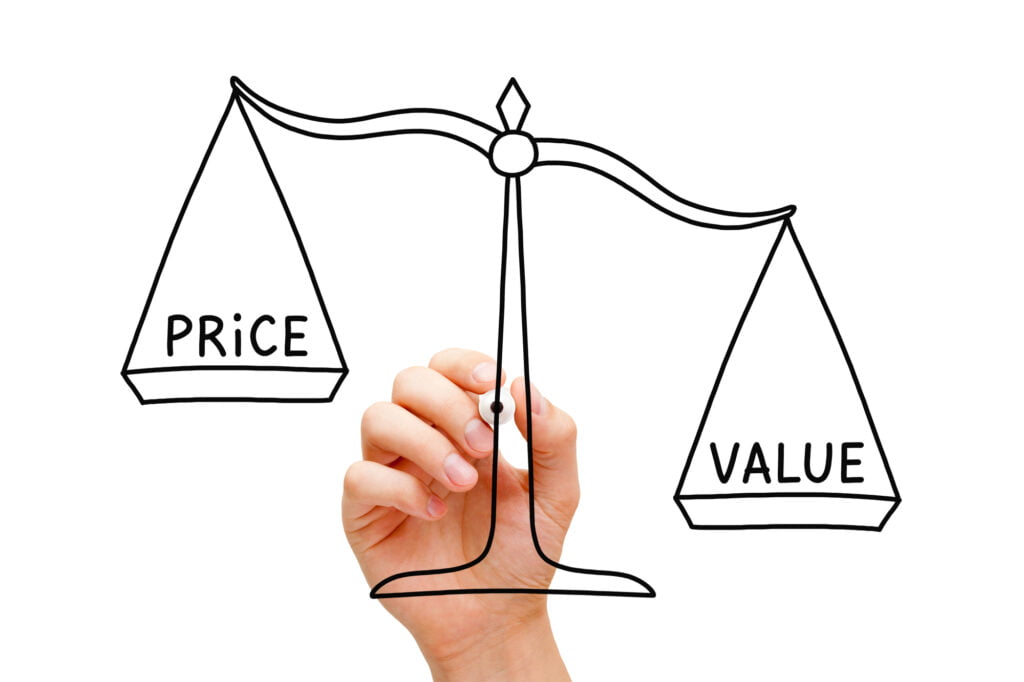
How Does Business Valuation In Shark Tank Work?
Valuing a business is a big deal on the TV show “Shark Tank.” This means figuring out how much the company is worth. People come to Shark Tank to ask for money from rich investors called Sharks, in exchange for a specific ownership percentage.
There are several terms used in Shark Tank when referring to the value of a company, that includes things like pre vs. post-money valuation, series A of rounds of financing, and so on. Here we will focus on the main concepts used to value a business.
Key Takeaways
- Valuation Fundamentals: Entrepreneurs must justify their company’s worth based on sales, debt, material costs, pricing, and customer acquisition costs. This initial valuation sets the stage for subsequent negotiations with the Sharks.
- Revenue and Earnings Multiples: Sharks primarily employ revenue and earnings multiples for valuation. This involves multiplying a company’s sales or earnings by an industry-specific factor, typically between two and twelve, or more. For instance, a business with $100,000 in revenue might be valued at $1.2 million if a multiple of 12 is appropriate.
- Discrepancies in Perceived Value: Often, there’s a difference between an entrepreneur’s perceived value of their business and the Sharks’ valuation.
- Importance of Intangibles in Valuation: Valuation on “Shark Tank” goes beyond numbers. Intangible factors like brand recognition, technological uniqueness, and social media presence are also considered. These aspects, though not directly quantifiable, can significantly enhance a company’s value.
- Pre vs post money valuation: The Sharks often need to juggle the pre vs post money valuation of a business to make better decisions on whether to invest or go out.
- Risks in Valuation and Influence of TV Exposure: Valuations on the show are subject to risks. That includes the entrepreneur’s overestimation of worth or the Sharks’ differing valuation methods. Additionally, the exposure from appearing on TV can impact the valuation process, as it can increase a company’s visibility and perceived value.
- Success Beyond Shark Tank: Some businesses that fail to secure deals on the show still achieve success afterward. A prime example is Ring, which didn’t get a deal on Shark Tank but later flourished into a billion-dollar company after investment from Richard Branson. This underscores that while Shark Tank offers a unique opportunity, it’s not the only pathway to success.
Table of Contents
Introduction to Valuation in Shark Tank
On Shark Tank, knowing how to value the business helps you better communicate with the Sharks. It matters in real life too when people want money for their businesses. Sometimes, what the owner thinks the company is worth and what the investor believes are different because they see its future differently. Recently, that happened in Season 15 of Shark Tank.
More often than not, owners and Sharks don’t agree on the value. This happens even when years later, that rejected business did well anyway. A great example is Ring, a company based in Santa Monica, CA, which started as Doorbot and left the Tank without a deal. Yet, after Richard Branson invested in it, and in 2023 Ring was valued at around $1.8 billion-dollar.
Understanding Valuation in the Shark Tank Pitch Process
Why does valuation carry such weight in the Shark Tank arena, and how might it shape an entrepreneur’s destiny amidst sharp scrutiny from seasoned investors? Grasping this concept is pivotal as business owners poised on this televised stage must articulate the worth of their ventures convincingly to secure much-needed investment.
What happens in Shark Tank?
Entrepreneurs must tell the sharks how much money they estimate their company is worth, based on various factors such as revenue, earnings, growth potential, and industry trends. This is called a valuation. If the sharks like the idea, they may give the entrepreneur money for a share of the company.
But first, they need to agree on its value! Getting this number right is important because it decides how much ownership the entrepreneur gives away and how much money a shark invests.
How do you calculate a company’s valuation based on investment and equity?
Company valuation based on investment and equity is typically calculated using the formula:
Post-Money Valuation = Investment Amount / Equity StakeFor instance, if an investor is willing to put in $200,000 for a 25% equity stake in the company, the calculation would be as follows:
Post-Money Valuation = $200,000 / 0.25 = $800,000This calculation suggests that the investor is valuing the company at $800,000.
The Shark Tank Valuation Methods
When entrepreneurs step into the “Shark Tank,” they face a crucial challenge: justifying their company’s worth through sound valuation methods. This determination not only influences investment decisions but also sets the stage for future financial negotiations.
Each technique, from multiples of revenue to projecting future market value, provides a different lens through which the business can be appraised. Which approach resonates best with the shrewd Sharks?
Revenue multiple
| Concept | Explanation | Example |
|---|---|---|
| Revenue Multiple | It’s the value of a company compared to its sales. | If you sell $300,000 a year, and the industry average multiple is 5, your business is worth $1,500,000. |
| Industry Specific Multiple | This is the number used to calculate revenue multiple, it depends on the industry. | In the tech industry, the usual multiple might be 6. So, a tech company making $100,000 is worth $600,000. |
| Negotiation Tool | It’s used to decide a company’s value and how much an investor will own. | If your company makes $500,000 and investors agree the multiple is 3, your company is valued at $1.5M. |
| Future Sales | If investors think the company will be big, they might use a bigger multiple. | If a company makes $250,000 now but is expected to grow, they might value it at $2,500,000 (multiple of 10). |
A revenue multiple looks at how much money a business makes from its sales. Sharks on the Shark Tank uses this method to calculate the value of a business, or the value of a company. They take the sales number, and multiply it by a number that reflects the industry average or the growth rate of the company. It is industry-specific, but generally, it’s between two and six. You can also see situations where a multiple of 12 is fair. In this case, if the Sharks agree that the company has a value of 1.2 millions with a $100,000 revenue, the deal is set.
Think about a company making $500,000 in sales last year. If sharks think businesses like this should be worth three times their sales, Sharks would say the company is valued at $1.5 million.
This simple math helps both sides start talking about how much of the company the sharks will get if they invest. Sharks want to pay less so they can make more money later. But sometimes, they agree that a business might have bigger sales in the future and give it a higher multiple.
Earnings Multiple
Now, let’s dive deeper into earnings multiple. Imagine you watch a business pitch on Shark Tank. They say their company earns $100,000 and has a 1 million valuation. The sharks will use those numbers to figure out the earnings multiple. In this case it would be 10 times the earnings. This is often something that Kevin O’Leary looks at!
To calculate this earnings multiple, sharks compare the profit of a company to its value based on sales. It sounds tricky but think of it like this; if your lemonade stand makes $50 in one day and someone offers you $500 for it, that’s an earnings multiple of 10. It means they’re willing to pay ten times what your stand earns in a day.
The trick comes when trying to guess future money. Will your lemonade stand to make more next year? How can you tell? Sharks have to think about this too! They might say yes to a forward earnings multiple that seems high, but might be attractive if they believe profits in the next three years would lead to an even higher valuation.
Understanding this part is key when you want Sharks or anyone else to invest money for a stake in the business. Get it right, and you may just strike a deal that benefits everyone involved!
Future market valuation

Can you guess what a company will earn tomorrow? That’s future market valuation. Sharks use this to see how much money your business might make later on and if it’s savvy to invest. It can be tricky. You have to think about how fast the business is growing and compare it with other similar companies.
It works like this. If your business made $100,000 the prior year and could make $200,000 next year, sharks may say it’s worth more now because of that possible growth. They use their experience to decide if they believe your numbers.
This guesswork involves looking forward and guessing earnings based on trends. And trends can also be sector-specific so that you can evaluate the trend of a sector by using the sector’s averaged data.
Sharks also check out risks and chances in the market when thinking about future value. They ask tough questions about your plans for making money after today. Because they want to know if investing is smart or too risky before putting up cash for part of the business.
Valuation of intangibles

Valuation of intangibles is like trying to measure how much a brand’s name, its ideas or even its relationships are worth. These things don’t show up as numbers on a balance sheet, but they can be super valuable. It’s not like looking at earnings in the next three years or so, but it’s more about the company valuation based on who they are, their values and ideas.
Think about Shark Tank. The show gets big ratings because it has these special, hard-to-measure parts that make people want to watch and learn.
On the show, entrepreneurs often talk about what makes their company special beyond just cash flow or assets—it could be their unique technology, or maybe they have an outstanding social media following built thanks to perseverance and hard work. It could even be that the business generated a lot of sales thanks to these intangibles, and that’s why a Shark takes into account multiple variables.
These extras can add big value to a business, according to the Sharks. They know that having access to their network of contacts and getting on TV can turn a small company into one everyone knows about and wants to buy from! That’s why intangible stuff matters so much when making deals on Shark Tank.
Tips for a Fair Business Valuation
Navigating the treacherous seas of valuation requires an astute understanding of factors that could drastically alter the perceived worth of a business; what risks do entrepreneurs face, and how does appearing on television influence investment perceptions? Dive deeper to master these critical considerations.
Risks to Consider During a Valuation
Valuation on “Shark Tank” can be tricky. Sharks have different ideas about what a company is worth. They look at the numbers but also think about other things like how unique your product is or if you have a patent.
Entrepreneurs might see their company as more valuable because they believe in it so much. This passion can create big differences in valuation. Yet, it is possible that the business might not succeed, even with a Shark on board. For example, a business might not generate enough sales to pay back the money to the Sharks. In this case the Sharks too would be in trouble…however, this is quite unlikely and it may be due to some issues with the entrepreneurs.
You might see at Shark Tank an entrepreneur’s valuation that seems fair, done using formulas and past sales to back it up. But risks pop up when sharks don’t agree with your math or future predictions for the business.
Sometimes, an entrepreneur sees their startup growing fast and wants to retain as much percentage of ownership as they can. But it can be that sharks may worry that it won’t make money as hoped.
Entrepreneurs need to show sharks good reasons for their value claim. Without strong evidence, you could face hard questions about your price tag, especially if profits are low now, and you’re banking on better days ahead.
Be ready to explain why your business should get the dollars you ask for – otherwise, you risk walking away without a deal because the Sharks won’t accept the valuation you pitched.
Impact of TV vs. Reality
TV shows like Shark Tank put a spotlight on the drama of business deals. They make us think all pitches are life-changing moments. But is that what really happens? Not always. Sure, the Sharks use real methods, like revenue multiple and discounted cash flow analysis when they value a business. Some other methods used are earnings multiple, market comparables, and discounted cash flow.
These are just like what venture capitalists and angel investors do in the real world to calculate the value of the company. And it is so competitive to get into because having access to the Sharks is a gigantic asset. They bring a ton of value to the company. That is why with Sharks asking for higher equities, often entrepreneurs are willing to reduce their ownership of the company. Business owners want their company to reach goals as high as the sky, and these goals typically require a stake higher than what an entrepreneur is asking.
The show does teach us how to tell our story well and what makes a good pitch, though – lessons that every seller needs!
Final Thoughts and the Bottom Line
In the Shark Tank, getting the value of a business right matters a lot. Sharks want to know what a company is worth. They look at sales and profits to make smart deals. If you pitch in Shark Tank, think hard about your company’s worth.
Make sure it makes sense to the Sharks!
Conclusion
Valuation in the Shark Tank pitch process can make or break a deal. It shows how much a business is worth and tells the sharks what they need to know before investing. If you get it right, you could walk away with a strong partner and the cash your business needs to grow.
Remember, knowing your numbers matters just as much as having a great idea. Make sure your valuation makes sense – it’s key to success on Shark Tank!
FAQs
What is valuation in the Shark Tank pitch process?
Valuation in the Shark Tank pitch process is how much an entrepreneur says their company is worth based on sales, profits, and future growth.
Why is getting your business’s valuation right important when pitching to the sharks?
Getting your business’s valuation right matters because if it’s too high or too low, the sharks might not agree to invest or ask for a bigger stake in your company than you want to give up.
Can sharks change an entrepreneur’s initial valuation during negotiations?
Yes, sharks often suggest changes to an entrepreneur’s initial business value if they think it does not match financial performance or sector standards.
What can happen if my future valuations are not realistic on Shark Tank?
If your estimates about what the business will make later are not believable, this could lead sharks to offer less money or decide not to put money into your business at all.
Should I mention sales from past years when discussing my startup valuations on Shark Tank?
Yes! Talking about past year’s sales helps show how well your business did before which helps prove what it might earn later; this can help back up why you say your company has a certain value.
What is pre-money valuation?
Pre-money valuation refers to the value of a company prior to receiving a new investment or funding round. This valuation represents an estimated worth of the company before any additional capital is injected by new investors.
What is post-money valuation?
Post-money valuation, on the other hand, includes the new capital that has been invested. It is calculated by adding the amount of new equity to the pre-money valuation of the company. This figure represents the company’s estimated worth immediately following the investment round.





